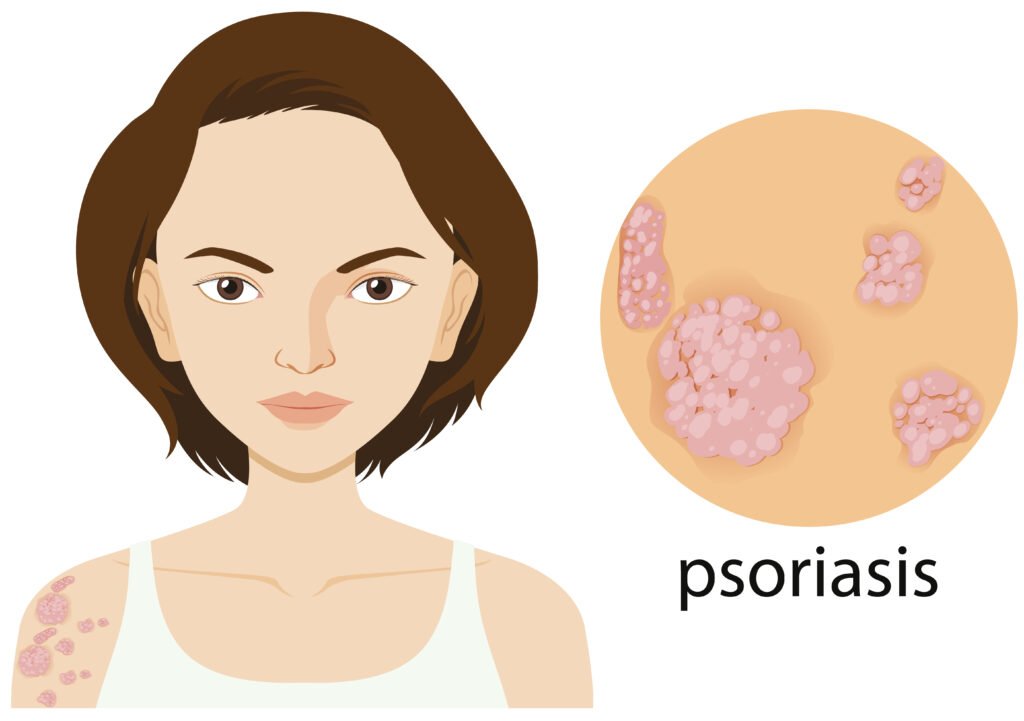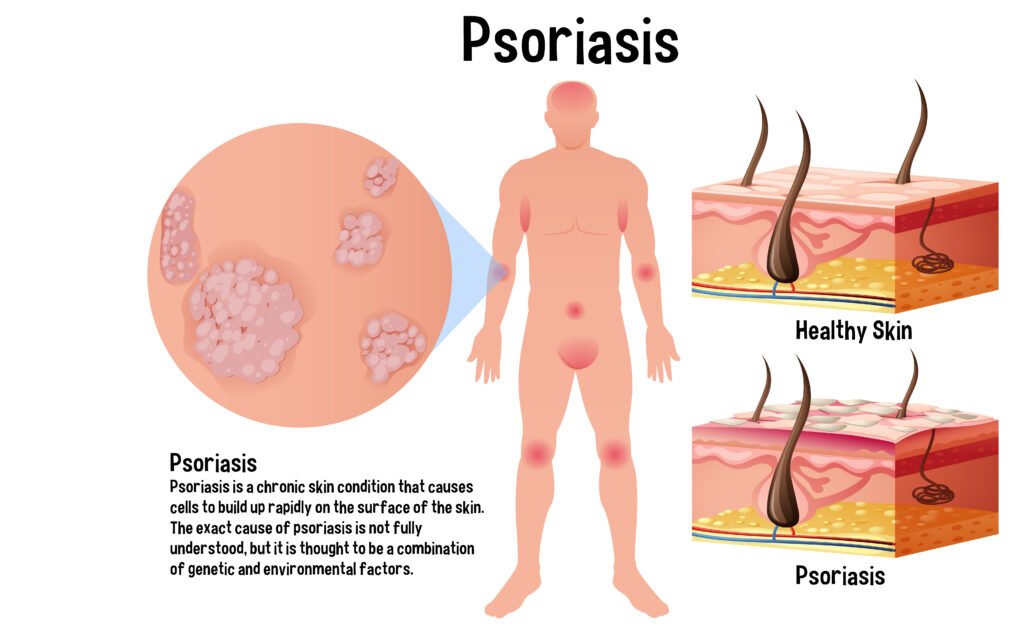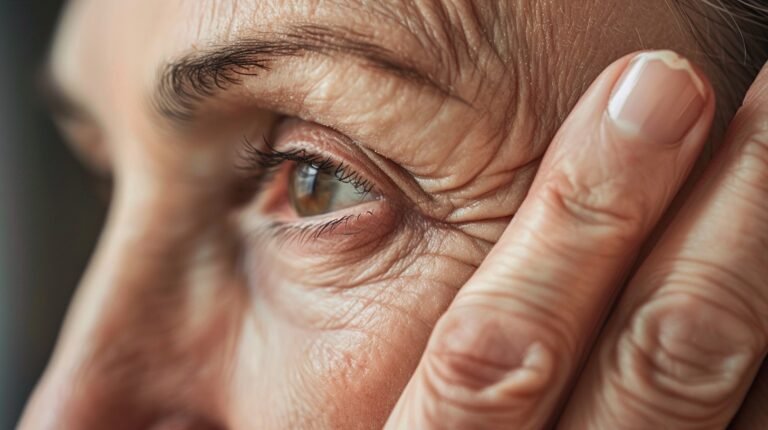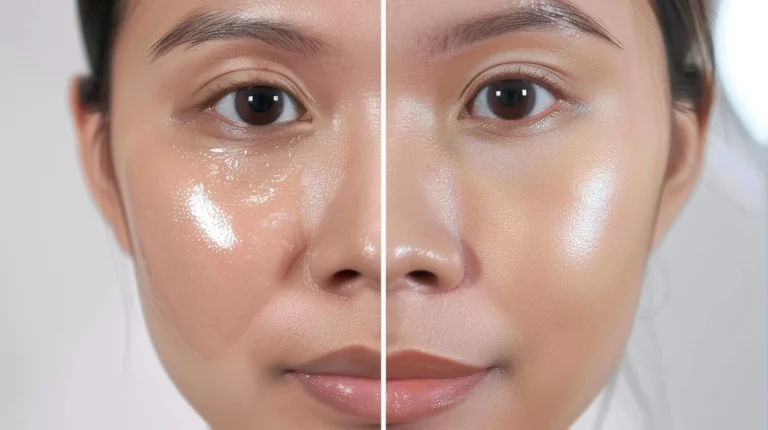Psoriasis Relief: What It Is, How It Develops, and Proven Ways to Manage It.
Welcome to our guide on psoriasis! If you’re new to this topic and want to know what psoriasis is, why it happens, and how to manage it, you’re in the right place. In this post, we’ll explain everything in simple terms, so you can better understand and take control of your skin health. Let’s get started!
Table of Contents
What Is Psoriasis?
Psoriasis is a chronic (long-lasting) skin condition that causes your skin cells to build up too quickly. This buildup leads to thick, red patches of skin covered with silvery scales. It can appear anywhere on your body, but it’s most commonly seen on the scalp, elbows, knees, and lower back.

Imagine your skin is like a well-organized factory. Normally, new skin cells are produced in the lower layers of your skin and move up to the surface over a few weeks. In psoriasis, this process speeds up, causing new cells to move to the surface too quickly. These cells pile up and form those characteristic patches.

How Does Psoriasis Develop?
Psoriasis is believed to be caused by a combination of genetic and environmental factors. Here’s a closer look at how it develops:
- Genetics: Psoriasis tends to run in families. If you have a close relative with psoriasis, you may be at a higher risk of developing it yourself.
- Immune System: Your immune system usually protects your body from infections. In psoriasis, your immune system mistakenly attacks healthy skin cells, causing inflammation and speeding up skin cell production.
- Triggers: Certain factors can trigger psoriasis or make it worse. These can include stress, infections, certain medications, and injuries to the skin (like cuts or sunburn).
Types of Psoriasis
There are several types of psoriasis, but here are the most common ones:
- Plaque Psoriasis: This is the most common type. It causes dry, raised, red skin lesions (plaques) covered with silvery scales.
- Nail Psoriasis: Affects the nails, causing pitting, discoloration, and even separation from the nail bed.
- Guttate Psoriasis: Often starts in childhood or young adulthood, causing small, water-drop-shaped, scaly patches.
- Inverse Psoriasis: Causes bright red, shiny, and smooth patches that appear in skin folds, such as under the breasts or around the groin.
- Pustular Psoriasis: Causes white pustules (blisters) filled with noninfectious pus, surrounded by red skin.
- Erythrodermic Psoriasis: The least common type, it can cover your entire body with a red, peeling rash that can itch or burn.
- Scalp Psoriasis: Affects the scalp, causing red patches covered with thick scales, which may extend beyond the hairline and lead to itching and flaking.
How to Manage Psoriasis
Managing psoriasis involves a combination of treatments and lifestyle changes. Here’s what you can do:
- Topical Treatments: These are creams or ointments applied directly to the skin. They help reduce inflammation, slow down skin cell production, and relieve itching. Common topical treatments include corticosteroids, vitamin D analogues, and tar products.
- Phototherapy: This treatment uses ultraviolet (UV) light to slow down the growth of skin cells. It is usually done in a medical setting under the supervision of a dermatologist.
- Systemic Medications: These are oral or injected medications that work throughout your body. They are usually prescribed for moderate to severe psoriasis. Examples include methotrexate, cyclosporine, and biologics.
- Lifestyle Changes: Certain lifestyle changes can help manage psoriasis:
- Moisturize Your Skin: Keeping your skin hydrated can help reduce itching and scaling. Use a good moisturizer daily.
- Avoid Triggers: Identify and avoid triggers that worsen your psoriasis, such as stress, smoking, or certain foods.
- Healthy Diet: Some people find that eating a balanced diet helps improve their symptoms. Omega-3 fatty acids, found in fish, are thought to be beneficial.
- Stress Management: Stress can trigger flare-ups, so practicing relaxation techniques like yoga or meditation can be helpful.
- Regular Check-Ups: Regular visits to a dermatologist can help keep your psoriasis under control and adjust treatments as needed.
Conclusion
Understanding psoriasis is the first step towards managing it effectively. By knowing what it is, how it develops, and how to treat it, you can better handle this condition and improve your quality of life. If you have any concerns or need personalized advice, don’t hesitate to consult a healthcare professional. It is always better to have knowledge about the diseases but it is always advisable to consult a doctor for better clarity and treatment. Don’t ever try to treat your diseases on your own with just knowledge you got on the internet!
If you like the content check out more of our posts in purelyglamour.com.
Feel free to share your thoughts or ask any questions in the comments below!
FAQs About Psoriasis
- Is psoriasis contagious? No, psoriasis is not contagious. You cannot catch it from someone else or spread it to others.
- Can psoriasis be cured? There is no cure for psoriasis, but treatments can help manage symptoms and reduce flare-ups.
- Is psoriasis the same as eczema? No, psoriasis and eczema are different conditions. Psoriasis causes thick, scaly patches, while eczema usually causes itchy, inflamed skin.
- Can diet affect psoriasis? Yes, some people find that certain foods can trigger or worsen their psoriasis. A healthy diet might help improve symptoms.
- How often should I use topical treatments? Follow your doctor’s instructions on how often to use topical treatments. Over use can sometimes irritate the skin.
- Can stress make psoriasis worse? Yes, stress is a common trigger for psoriasis flare-ups. Finding ways to manage stress can help control symptoms.
- What is the role of UV light in treating psoriasis? UV light can slow down skin cell growth and reduce inflammation. This treatment should be done under medical supervision.
- Are there any home remedies for psoriasis? Some home remedies, like using aloe-vera or oatmeal baths, may provide relief, but they should not replace prescribed treatments.
- Can psoriasis affect my overall health? Psoriasis is a chronic condition that can impact your overall health and quality of life. It’s important to manage it properly and seek medical advice if needed.
- When should I see a doctor for psoriasis? You should see a doctor if you notice new or worsening symptoms, if Non-prescription treatments aren’t working, or if you have concerns about your condition.






